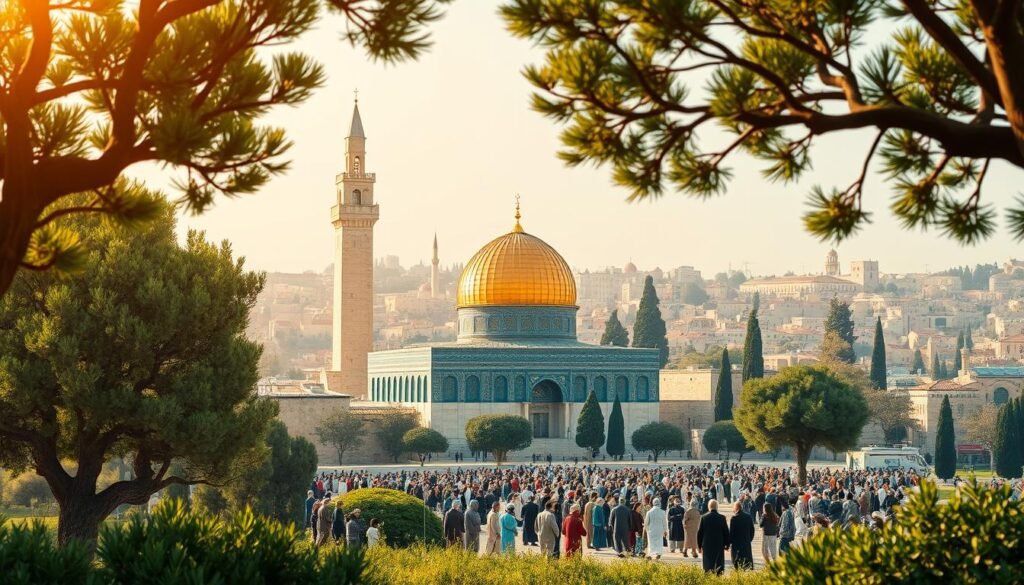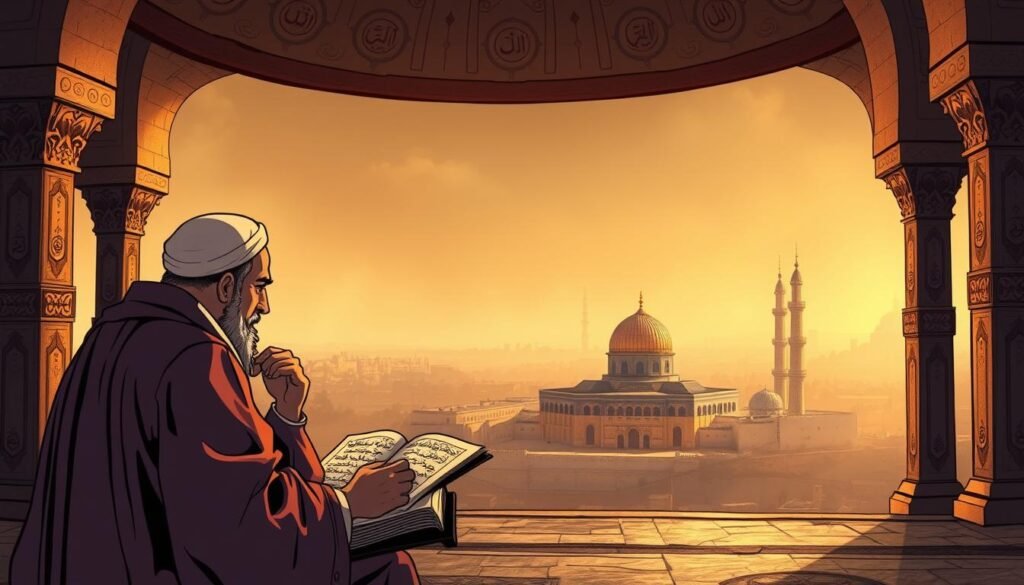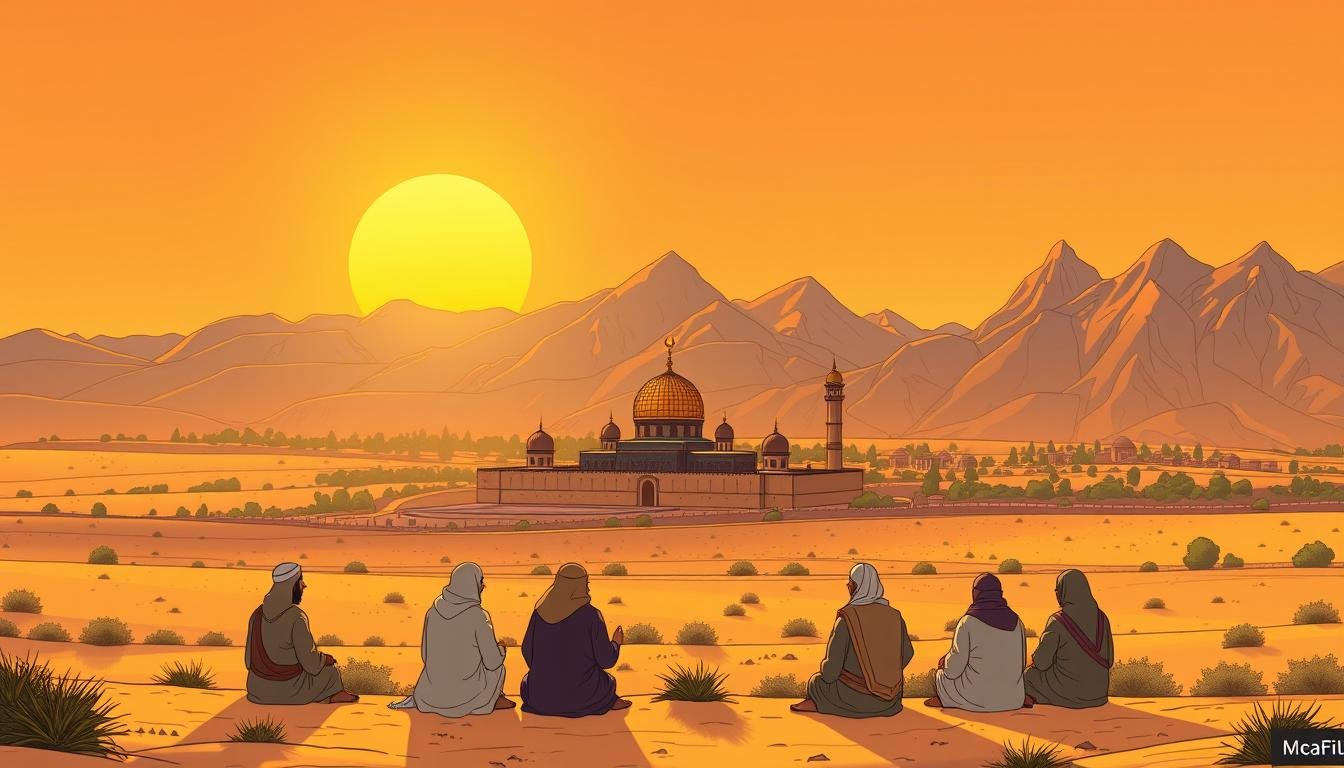Every time I visit Al-Aqsa Mosque, I hear voices. It’s not just the call to prayer. I hear the echoes of a land central to our faith for centuries. Palestinians today face a 70-year occupation, with checkpoints and bombings mirroring the Prophet Muhammad’s struggles in Mecca.
Israeli leaders often dismiss Palestinian lives, saying things like “mowing the grass.” They block access to Al-Aqsa, ignoring our tradition. The Prophet Muhammad’s Night Journey to Jerusalem made this land sacred centuries ago. Yet, today, Palestinians face restrictions worse than open prisons.
This article explores prophetic teachings that connect past and present. From the Battle of Badr’s lessons on resilience to the Prophet’s warnings about land theft, these hadiths are guides. They remind us to stand firm in justice when leaders chant “Death to Arabs.” Let’s see how the Prophet’s words about Palestine relate to today’s struggles and how faith can guide us.
Understanding Hadiths: The Preserved Words of Prophet Muhammad
Islamic tradition uses hadiths to understand the Quran. But, how do we know if a saying is from the Prophet? Scholars have a system to check every word for centuries.
Let’s look at how they do it. It starts with checking if a hadith is authentic.
What Constitutes an Authentic Hadith
An authentic hadith needs two parts: the isnad (chain of narrators) and matn (text). Scholars check each narrator’s trustworthiness. They look for any doubt in the chain.
Even one wrong link can make the whole report questionable. This makes sure the message is from the Prophet. It’s like solving a historical mystery.
The Importance of Hadith in Islamic Jurisprudence
Hadiths are key in Islamic law, after the Quran. They help with rules on prayer, charity, and more. For example, they guide on defending holy places like Palestine.
Without them, legal discussions would be hard. Imagine dealing with today’s conflicts without clear rules on sacred sites.
How Hadiths Are Classified and Verified
Scholars sort hadiths into types like sahih (authentic), hasan (good), or da’if (weak). Sayings about Palestine’s holiness are checked very carefully.
Even a small mistake in the chain makes it invalid for legal use. This method keeps teachings true to their origin. It connects ancient wisdom to today’s issues.
The Historical Context of Palestine in Islamic Tradition
Palestine is sacred in Islamic tradition because of its long history. It goes back to Abraham and Jesus, before Muhammad. This land is seen as a sign of God’s presence.
Early Muslims believed this land connected heaven and earth. The Quran talks about Al-Aqsa Mosque in Jerusalem. This shows Jerusalem’s importance in Islam.
Exalted is He who took His servant by night from the Sacred Mosque to the Farthest Mosque, whose surroundings We have blessed — Quran 17:1.
The Night Journey made Jerusalem a key place in Islam. Scholars say it made local shrines important worldwide. Hadiths show how Palestine’s history is kept alive in Islam.
Muslims call Palestine the Holy Land. This honors its past and makes it relevant today. It’s a key part of Islamic identity, as we’ll see in more stories.
Famous Hadith About Palestine and Al-Aqsa Mosque
The Al-Aqsa hadith and Jerusalem in hadith show deep spiritual ties. The Prophet’s Night Journey, Isra and Mi’raj, is key. Anas ibn Malik’s story of riding the Buraq to Jerusalem shows Al-Aqsa’s importance:
“I was brought the Buraq. I took it up to Jerusalem. There, I fastened it to the ring to which Prophets fasten animals. Later, I entered the Masjid and performed prayers…”

Palestine is often praised in hadith. One story says prayers at Masjid al-Aqsa are 500x more rewarding than elsewhere. Scholars agree. Jerusalem in hadith also shows its divine favor. The Prophet said prayers there are like 5,000 elsewhere, showing its closeness to God.
Hadiths talk about Jerusalem’s lasting importance. The Prophet said a group of believers will protect its faith until the end of time. This gives hope. But, scholars are careful. They separate true stories from weaker ones. This keeps teachings true to tradition and relevant today.
The Significance of Al-Quds (Jerusalem) in Prophetic Teachings
Jerusalem is more than just the Palestinian holy land. It’s special because of Prophetic sayings about it. These teachings show its spiritual importance and God’s favor.
Even before the prayer direction changed, Al-Quds was seen as a key to divine truths. This was revealed in early messages from Makkah.
Jerusalem as the First Qibla
For 16 months, Muslims prayed towards Al-Aqsa Mosque. This was based on a Quranic verse, “We see the turning of your face toward the sky…” (2:144). Even after the prayer direction changed, Jerusalem’s holiness remained.
This change showed God’s wisdom. Scholars say it highlights Jerusalem’s lasting spiritual value. A saying from the Prophet (peace be upon him) says, “The earth was made a place of prayer, and its first qibla was Jerusalem.”
The Prophet’s Special Connection to Al-Aqsa
The Prophet (peace be upon him) had a deep connection to Al-Aqsa. He said, “A time will come when a person will not enter Al-Aqsa Mosque without it being recorded as a good deed.”
This shows its importance as a place of prayer for all prophets. The Isra journey connected Al-Aqsa to the heavens. It’s a bridge between the earthly and divine.
The Prophet’s night journey started here. It symbolizes Al-Aqsa’s role as a gateway for divine messages.
Analyzing the Chain of Narration in Palestine-Related Hadiths
The Islamic view on Palestine depends on checking hadith authenticity. Scholars look at the isnad—the chain of narrators—to see if traditions about Palestine are Authentic hadith Palestine. This makes sure teachings match the Prophet’s words.
Companions like Abu Dharr al-Ghifari and Abu Hurairah are key. They shared important stories about Al-Aqsa and Jerusalem. Their stories are checked for accuracy over time.
For example, hadiths in Sahih Bukhari and Muslim are widely accepted. They talk about Palestine’s importance. But, some found only in secondary collections like Ibn Majah are debated.
Why is this important? Wars like the Siffin War led to fake hadiths. Today, knowing reliable sources is key to the Islamic view on Palestine. Scholars like al-Nawawi pointed out differences in some Sahih narrations, urging careful study.
Questions about a hadith’s transmission matter a lot. Is it mutawatir (mass-narrated) or ahad (singular)? This affects its importance in Islamic teachings.
By studying these chains, we respect the Prophet’s teachings. Verified narrations keep our understanding of Palestine’s sacredness true. This balance helps communities apply timeless wisdom to today’s challenges.
Modern Interpretations of the Hadith About Palestine
The Islamic view on Palestine is a key topic in today’s scholarship. Scholars like Dr. Abdullah bin Bayyah show how the Prophet Muhammad’s teachings inspire today’s activism. They see the Prophet’s journey to Al-Aqsa as a call to action today.

“The Prophet’s connection to Jerusalem reminds us that justice for Palestine is a shared responsibility,” says Dr. Aminah Assilmi, referencing hadiths about supporting for the oppressed. Modern analysis often links Surah Al-Baqarah 2:155’s teachings on perseverance to Gaza’s resilience today.
Contemporary Scholarly Perspectives
Scholars discuss how to apply the Prophet’s teachings to today’s problems. Some, like Sheikh Hamza Yusuf, advocate for peaceful activism. Others, like Palestinian jurists, suggest using legal means to defend their land.
This variety shows Islam’s ability to adapt—over 850 global scholars now support statements against occupation. They bridge ancient teachings with modern views.
Contextualizing Ancient Teachings Today
How do 7th-century texts relate to today’s conflicts? Many see parallels between the Prophet’s struggles and Palestinian resilience. The Quran’s focus on justice guides ethical responses to violence.
Yet, debates continue on how to balance faith with political action. Should solidarity involve protests, aid, or interfaith efforts?
These discussions show Islam’s dynamic nature. Scholars like Dr. Khaled Abou El Fadl say tradition’s wisdom is timeless when understood with empathy. The challenge is to apply these principles in real ways—through education, advocacy, or prayer.
How These Prophetic Sayings Shape Muslim Attitudes Toward Palestine
Prophetic teachings are at the heart of Muslim identity. They shape views on the Palestinian holy land for generations. From Jakarta to Chicago, stories of Al-Aqsa and the Night Journey spark devotion worldwide. Wonder how 1,400-year-old traditions move us today?
Spiritual Connection to the Holy Land
Hadiths link Muslims to places like Al-Aqsa, even if they’ve never been there. The Prophet said, “The first mosque on Earth is Al-Aqsa, the second is this mosque in Medina” (Bukhari). This anchors faith in physical places. Art, poetry, and sermons often bring up Jerusalem, guiding many Muslims spiritually.
Religious Duty and Solidarity
These teachings turn belief into action. The Islamic view on Palestine sees helping Palestine as a moral duty. “Whosoever dies without visiting Jerusalem dies with a sin” (Tirmidhi). This duty shows in prayers, donations, and speaking out. Yet, challenges remain, like the need for more Muslim interest in Palestine’s history.
Even as Gulf states sometimes falter, a hadith says, “Supporting Palestine is like supporting Islam itself” (Ibn Majah). This fuels global efforts from Gaza solidarity to social media campaigns.
With the Muslim population nearing 1.9 billion, these stories remind us: Palestine’s cause is a spiritual promise. How will this generation keep its promise?
Misconceptions and Misinterpretations of Palestine-Related Hadiths
Understanding Authentic hadith Palestine needs careful thought. Many contemporary discussions mix old history with today’s goals. This makes the Hadith about Palestine hard to understand.
Some say visiting Al-Aqsa is more rewarding than other mosques. But many of these sayings are weak. Also, claims about Jerusalem’s future are often not checked well. These mistakes hide the Prophet’s true teachings.
Common Misquoted or Fabricated Hadiths
Many weak sayings are seen as Authentic hadith Palestine. For example, a fake saying says Jerusalem’s freedom will bring Islamic victory worldwide. Scholars like Ibn Kathir and Albani say no to these claims. Emotions often lead to mistakes in understanding.
Early Islamic texts didn’t always focus on Jerusalem. This is shown in al-Yaqut’s work.
Guidelines for Proper Understanding
We should only trust Hadith about Palestine that are proven true. First, check them in Sahih al-Bukhari. Second, understand them in the context of the Prophet’s time. For example, the Authentic hadith Palestine about Al-Aqsa is balanced with Quran’s focus on Makkah.
Third, listen to experts who know both the text and history well.
Let’s follow the Prophet’s advice: “Tell me even a single verse.” This way, our support for Palestine will be based on faith, not politics. By using verified sources, we respect both our faith and our minds.
Applying Prophetic Wisdom to Contemporary Palestinian Issues
Islamic teachings on justice and compassion are key to solving today’s Palestinian problems. The Gaza tragedy shows a crisis caused by decades of occupation. The Quran says killing one person is like killing all humanity (Quran 5:32). This calls for the world to notice Palestinian suffering.
The Quranic principles of peace, like the Prophet’s Hudaybiyya treaty, show diplomacy can solve conflicts. This approach avoids violence.
Justice for Palestine means treating everyone with dignity. Ehud Olmert’s words on territorial compromise show we need fair solutions. The Prophet taught us to seek peace over war, as the Quran says (Quran 49:10).
Today, we need new strategies. The Palestinian move to violence goes against Islamic teachings. These teachings value protecting civilian lives.
Islamic history teaches us peace in Palestine starts with respect. The Quran’s story of Joseph shows how to work together. As Muslims, we must fight for justice based on prophetic wisdom. This ensures Palestinian rights and global peace go hand in hand.
FAQ
What are hadiths, and why are they important in Islam?
How can I verify the authenticity of a hadith?
Why is Palestine significant in Islamic tradition?
What are the main authentic hadiths regarding Palestine?
How did the Prophet Muhammad’s teachings shape Muslim perspectives on Palestine?
What misconceptions should I be aware of regarding hadiths about Palestine?
How can ancient teachings be applied to current issues in Palestine?

Embracing Faith, One Insight at a Time!
The teachings of the Quran have always guided my path. With a deep passion for Islamic knowledge, I strive to blend the wisdom of tradition with the relevance of today, making the timeless messages of Islam accessible and meaningful for everyone.
Muslim Culture Hub is my platform to share historical insights and thought-provoking articles, exploring both well-known and lesser-discussed aspects of Islamic culture and beliefs. My mission is to create an inclusive online space where everyone can learn, strengthen their faith, and connect with the profound message of Islam.
Join the journey!
May peace be upon you.








